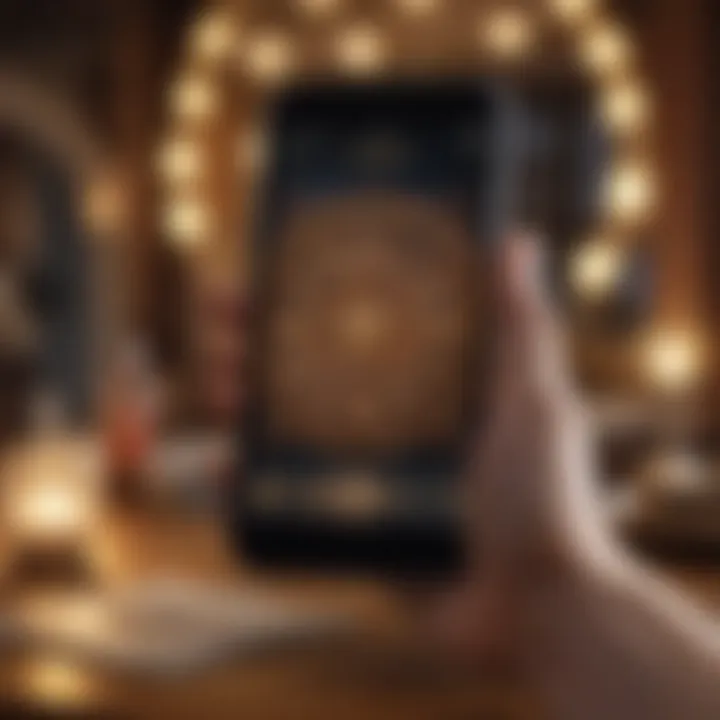Astrology and Horoscope Apps: Integration and Insights


Intro
Astrology and horoscope applications are becoming increasingly central in contemporary life. This digital trend resonates especially with individuals who seek to understand themselves and their relationships more deeply through astrology. Users often turn to apps for personalized insights that align with their birth charts and zodiac characteristics. As technology advances, these applications not only enhance accessibility but also foster a sense of community among users. However, the growing dependence on digital astrology tools raises significant questions regarding accuracy and data security, both of which deserve discussion.
Zodiac Sign Overview
General Traits
Understanding zodiac signs serves as the foundation of astrological interpretation. Each sign carries a distinctive set of traits, which shape an individual's personality and their interactions with the world around them. For instance, Aries is known for its boldness, while Taurus exemplifies stability and determination. Recognizing these traits allows users to engage more meaningfully with their astrological profiles.
Element and Modality
Astrological signs are categorized into four elements: Fire, Earth, Air, and Water. These elements dictate fundamental qualities. Fire signs, such as Aries and Leo, thrive on action and passion. Earth signs like Taurus and Virgo exhibit practicality and groundedness. There are also modalities—Cardinal, Fixed, and Mutable—each representing how signs express their qualities in the world. Cardinal signs are initiators, Fixed signs are stabilizers, and Mutable signs are adaptable.
Strengths and Weaknesses
The strengths and weaknesses inherent to each zodiac sign provide crucial insights. For example, Leo's ambition can be both inspiring and overwhelming. Understanding these dichotomies enables individuals to harness their strengths while mitigating their weaknesses. This balance, when utilized effectively, enhances personal growth and relationships.
Detailed Horoscope Analysis
Daily Horoscope Breakdown
Daily horoscopes are perhaps the most popular feature available on astrology apps. They provide quick insights into what the day holds based on astrological transits. Users can receive information that may help them navigate challenges and seize opportunities.
Weekly and Monthly Predictions
For more comprehensive guidance, many apps offer weekly and monthly predictions. These insights delve deeper, highlighting key events and trends that may influence an individual's life. This longer-term perspective enables users to plan and prepare for upcoming challenges and moments of growth.
Key Planetary Influences
Astrology operates on the movement of celestial bodies, making it essential to stay informed about key planetary influences. Each planet holds unique meanings, and their configurations can result in various energies that shape our experiences. For instance, Mercury retrograde is often associated with communication mishaps but can also be a time for reflection and review.
Astrology for Personal Growth
Understanding Birth Charts
A birth chart—or natal chart—is an intricate map of the sky at the moment of an individual's birth. It outlines the cosmic influences affecting one’s life path and personality. Many apps now offer in-depth analyses of birth charts, helping users illuminate their inner selves.
Tips for Embracing One's Zodiac Traits
Accepting and embracing zodiac traits can enhance personal well-being. Practicing self-awareness fosters a deeper understanding of one's behaviors and motivations. Utilizing astrological insight, individuals can learn to embrace their inherent gifts while also addressing their limitations.
Astrological Practices to Enhance Life
Many users look for practices to integrate astrology into their daily lives. Meditation, journaling, and setting intentions based on lunar phases are common methods. These practices not only encourage personal exploration but also connect individuals more deeply with their astrological identities.
Preamble to Astrology and Horoscope Apps
Astrology and horoscope applications have gained significant attention in recent years, especially with the rise of digital technology. Understanding their role is essential for anyone interested in astrology. These apps enhance accessibility, allowing users to explore their astrological personalities more than ever before. They offer immediacy; users can dive into insights about their lives at their fingertips.
The integration of astrology into easily usable apps has made this ancient practice relevant for a new generation. Young people, who often question the traditions of the past, find value in these tools. The engagement often turns into a hobby or even a passion, which speaks to the apps' effectiveness in capturing attention. Moreover, these platforms bring a community of like-minded individuals who share similar interests in astrological phenomena. Consequently, they are not just tools but also platforms for connection.
Understanding Astrology in the Digital Age


Astrology in the digital age takes on new forms and interpretations. The digital landscape provides an opportunity for astrology to evolve. Here, the focus shifts from solely dependent textbooks or workshops to immediate, personalized experiences. Digital platforms facilitate real-time interactions. Users can explore complex astrological concepts at their own pace, fostering both understanding and enjoyment.
Moreover, astrology apps provide users with a sense of agency. By inputting their information, individuals gain personalized insights and forecasts tailored to their birth charts. Thus, a deeper comprehension of the self emerges, allowing for personal growth through astrological practices. With this shift, even the skeptics begin to appreciate how engaging and valuable astrology can be.
The Evolution of Horoscope Apps
The rise of horoscope apps speaks volumes about technological advancements. Initially, horoscopes were generally accessible through newspapers and magazines. But now, these apps deliver tailored horoscopes daily or even hourly, based on real-time data. This rapid evolution reflects a broader change in how individuals consume information in the modern world.
Applications now provide various types of services, from daily predictions to in-depth analyses of personal horoscopes. They employ algorithms that consider multiple astrological variables, making predictions more nuanced. Users enjoy an array of features, from notifications about significant astrological events to reminders for important lunar phases.
-> Apps such as Co-Star and The Pattern have transformed the way people connect with astrology, providing insights not previously available to the masses.
In summary, horoscope apps have transitioned from archaic forms of
Core Features of Astrology Apps
Astrology apps have revolutionized how users interact with the celestial influences that pertain to their lives. The core features of these applications are not just beneficial; they are essential. These functionalities cater to the needs of both novice and seasoned astrology enthusiasts. By understanding these key elements, users can maximize their experience and gain deeper insights into their astrological profiles.
Personalized Horoscope Generation
Personalized horoscope generation stands out as one of the most significant features of astrology apps. With the input of specific birth details — date, time, and geographical location — users can receive tailored astrological predictions. Unlike generic predictions, personalized horoscopes take into consideration individual planetary positions, which result in more accurate and relevant insights for the user.
This feature can assist users in navigating daily challenges or planning future activities. Many apps use algorithms that generate horoscopes instantaneously, providing users with real-time insights into their lives. In this way, the integration of personalized findings enhances the user experience, ensuring that astrology resonates with the individual.
Birth Chart Analysis
Birth chart analysis is another core feature in astrology apps. This analysis maps out the positions of celestial bodies at the exact moment of a person's birth. By interpreting this chart, users can uncover layers of meaning behind their personalities, strengths, and weaknesses. It is a detailed examination of one's astrological blueprint.
Many apps provide visual representations of birth charts, making it easier for users to comprehend complex astrological information. The process of interpreting these charts often involves elements such as houses, aspects, and signs, which can all influence individual life paths. Thus, accurate birth chart analysis is crucial for understanding one's astrological identity.
Astrological Compatibility Insights
Understanding astrological compatibility is invaluable for many users. This feature offers insights into relationships based on the zodiac signs of two individuals. Users can explore the strengths and challenges present in their relationships by examining aspects such as sun sign compatibility, moon sign interaction, and rising signs.
Compatibility insights can apply to various relationships — romantic, platonic, or familial. When users understand their peaks and valleys in relationships through astrological compatibility, they can improve communication and resolve conflicts more effectively. This tool reinforces the practicality of astrology in real-world interactions.
Lunar Cycle Tracking
Lunar cycle tracking is an essential feature for many astrology apps. The moon influences human behavior, emotions, and natural rhythms. By tracking the phases of the moon, users can align their activities with these lunar cycles. For instance, many choose to start new projects during the new moon or engage in reflection when the moon wanes.
Astrology apps often include calendars and notifications that alert users to lunar events. This guidance can assist individuals in harnessing the energy of the moon to enhance personal productivity and emotional well-being.
In summary, the core features of astrology apps significantly enhance the user's experience by providing individual insights through personalized horoscopes, in-depth birth chart analysis, compatibility assessments, and lunar cycle tracking. These functionalities highlight the broader integration of astrology in daily life, promoting a more profound understanding of oneself and one's relationships.
User Engagement and Experience
User engagement is a crucial aspect of astrology and horoscope apps. It directly influences how users perceive and interact with these platforms. When an app succeeds in engaging its users, it not only fosters a sense of community but also enhances the overall experience. Engaged users tend to return frequently, which is vital for an app's longevity. They feel more connected to the app and its content, and this connection can lead to deeper exploration of astrology’s intricacies.
The benefits of engagement are manifold. Firstly, it allows users to personalize their experience. People often seek validation in their astrological readings. When apps offer tailored insights based on individual preferences, users feel a stronger bond to the content. Secondly, active participation can lead to a wider understanding of astrology. Users who engage more with the app are likely to learn and explore different aspects of astrology, enriching their knowledge and experience.
Considerations about user engagement include user interface design, content relevance, and accessibility. An intuitive design can significantly enhance the user experience. If users find it easy to navigate the app, they are more likely to stay longer. Furthermore, relevant content matters. Users crave insights that resonate with their personal lives. Therefore, apps must ensure they provide timely and meaningful information.
Interactive Features Within Apps


Interactive features are vital for maintaining user interest in astrology apps. These functions transform passive users into active participants, creating a more vibrant environment. For example, quizzes can help users discover their astrological profiles or compatibility with others. This not only entertains but also educates.
Some apps offer live consultations with astrologers. This feature adds a personal touch, making the experience feel bespoke. Users can ask questions and receive immediate feedback, leading to a more engaging experience.
Moreover, gamification elements, like rewards for daily logins or completing readings, can motivate users to interact more with the app. These interactive features enhance the overall experience by making it less about reading and more about engaging.
Building a Community of Enthusiasts
Creating a vibrant community around astrology apps is essential for fostering engagement. Users benefit from sharing experiences and insights with like-minded individuals. The sense of belonging can encourage users to return to the app regularly.
Many applications include forums or chat functions. These enable users to connect, discuss their readings, and seek advice. An active community can drive discussions that lead to deeper insights into astrological principles.
Additionally, social media integration, particularly with platforms like Facebook or Reddit, can help users share their experiences beyond the app. Users can post their horoscopes, ask for opinions, or discuss findings in larger communities. This creates a chain reaction, drawing more users into the app through shared experiences.
In summary, enhancing user engagement and experience involves interactive features and community-building strategies. As astrology apps evolve, these aspects will play a vital role in enriching the user journey.
Technological Impact on Astrology Practices
The technological landscape has transformed many fields, and astrology is no exception. In recent years, astrology apps have emerged as powerful tools that democratize access to astrological knowledge. These applications integrate advanced features, making astrological information more accessible to a wider audience. The impact of technology on astrology extends beyond just user convenience. It influences how practices are performed and understood in the digital age.
One significant element is the ability to collect and analyze vast amounts of data. Modern astrology apps are equipped with capabilities to gather user information and preferences through their interactions. As users engage with features like personalized horoscopes or compatibility assessments, these apps accumulate data that reveal trends and patterns.
This data-driven approach enables astrologers to refine their methods and interpretations. By understanding how users react to different astrological insights, apps can evolve their offerings. This results in a better user experience that meets the varied expectations of astrology enthusiasts.
Data-Driven Insights in Astrology
Data-driven insights have become essential in modern astrology. Apps like TheAstromix utilize user data to generate personalized experiences. The underlying algorithms process this data, transforming static astrological concepts into dynamic and user-specific interpretations. These insights assist users in navigating their lives by offering relevant guidance tailored to their astrological profiles.
Furthermore, these applications can analyze collective trends among users. For instance, if a particular astrological event correlates with certain outcomes in user lives, developers can adjust the content accordingly. This ability not only enhances the relevance of the insights provided but also fosters a sense of community among users who share similar experiences based on their astrological signs.
The Role of Machine Learning in Horoscope Accuracy
Machine learning is a burgeoning area that significantly improves the accuracy of horoscopes created by astrology apps. By employing machine learning algorithms, these apps can continuously learn from user feedback and adapt to changing preferences. This means that the more users interact with the app, the smarter it gets.
For instance, if many users indicate that a certain prediction was not accurate, the algorithm can analyze the factors that lead to the discrepancy. Over time, this process refines the predictive models used for horoscopes. Notably, apps that incorporate this technology strive to offer highly personalized content that resonates with users on a deeper level.
Machine learning also facilitates a broader range of astrological data analysis, which can lead to better compatibility insights and forecasts based on user patterns. As these tools evolve, the precision of astrological readings is strengthened, making them more relevant to modern users.
The merging of technology and astrology is not only redefining practices but also reshaping how individuals interact with their astrological identities, providing a unique blend of personalization and insight.
Addressing Concerns About Astrology Apps
In the expanding realm of astrology and its intersection with technology, user concerns must be taken seriously. Addressing these concerns is essential for a sustainable and trustworthy ecosystem. Users often seek clarity not only in astrological insights but also in how their personal information is handled. This section details two critical aspects: the accuracy of astrological readings and privacy and data security issues.
Accuracy of Astrological Readings
The accuracy of astrological readings is a fundamental concern for users of horoscope apps. Many users expect the guidance provided by these apps to be reliable and tailored to their specific circumstances. However, several factors influence the perceived accuracy of these readings.
- Astrological Methodology: Different apps may utilize various astrological systems, such as Western astrology or Vedic astrology. This divergence can lead to differing interpretations or predictions.
- Software Algorithms: The algorithms powering these applications play a significant role. Apps that incorporate user data effectively can produce more personalized and relevant insights. However, the limitations of the algorithms can lead to generalized readings that may miss the nuances of individual circumstances.
- User Input Quality: Users entering inaccurate birth information can skew the results. It's important for apps to emphasize the need for precise data entry to enhance the accuracy of astrological insights.
In sum, while many users seek concrete outcomes, the multifaceted nature of astrology complicates the quest for universally accurate readings. Encouraging users to critically evaluate their experiences with apps is essential for healthy skepticism and informed use.
Privacy and Data Security Issues


Another pressing issue in the world of astrology apps is privacy and data security. With personal data being collected, users naturally have apprehensions about how this information is used and safeguarded. Addressing these concerns involves several key considerations:
- Data Collection Practices: Many apps collect sensitive data, including birth dates, locations, and personal preferences. Transparency is crucial. Users should know what data is being collected and for what purpose.
- User Consent: Consent protocols should be clear and easily accessible. Users must feel empowered to choose what personal information they share.
- Data Storage and Protection: The methods of data storage also warrant scrutiny. Secure encryption and limited access help protect user information from unauthorized access or breaches.
- Policy Transparency: Apps that outline their privacy policies clearly can build trust. Users need to understand how their data will be used, shared, and ultimately protected.
Astrology App Recommendations
Astrology apps have become widely popular as users seek to explore their astrological identities and gain insights into their lives. With the vast array of applications available, making informed choices is important. This section highlights popular apps suited for distinct levels of users and examines advanced tools available for seasoned practitioners. Each recommendation presents unique features tailored to meet varying needs, offering benefits and considerations that align well with user experiences.
Popular Apps for Beginners
Beginning the journey into astrology can feel overwhelming. Thus, user-friendly apps that simplify the experience while providing essential information are crucial. A few noteworthy applications stand out for beginners seeking basic knowledge of astrology:
- Co–Star: This app utilizes NASA data to generate personalized daily horoscopes based on user birth charts. Its sleek design and simple interface make it easy for new users.
- AstroFuture: This app provides in-depth natal chart interpretations, which help users understand the planetary influences in their lives. A straightforward layout allows easy navigation and comprehension.
- The Pattern: Offered as a social platform, this app encourages users to connect based on astrological patterns in their lives. Its engaging format attracts curious minds and fosters community.
These apps tend to focus on accessibility, support, and user engagement, making them ideal for newcomers who wish to learn without feeling overwhelmed. Each app provides key resources that encourage growth as users delve deeper into astrology.
Advanced Tools for Practitioners
For experienced astrologers, advanced apps offer tools to enhance astrological practice. These applications can provide complex calculations, in-depth analyses, and features that facilitate a more profound understanding of astrology. Top instruments for practitioners include:
- Solar Fire: Recognized as one of the most comprehensive astrology software programs, Solar Fire provides detailed charting, progressions, and transits that cater to professional astrologers.
- AstroGold: This mobile application targets both amateurs and professionals. It features accurate astrological calculations and visualizations, enhancing presentations for clients.
- TimePassages: This software provides deep insights into natal charts and offers real-time tracking of transits. Its versatility allows for exploration of horary and electional astrology as well.
In summary, both beginners and seasoned practitioners can discover a wealth of astrology applications suited to their respective levels of expertise. By selecting appropriate tools, users can cultivate their understanding of astrology more efficiently and effectively. As interest in astrology continues to grow, so does the need for tailored applications that enhance user experience and knowledge.
Future Trends in Astrology Apps
The realm of astrology apps is always evolving. Future trends indicate that these applications will integrate new technologies to enhance user experience. Trends in augmented reality and personal AI technology are likely to lead to more engaging and personalized experiences for users. As interest in astrology continues to grow, these advances hold significant implications for how users connect with astrological insights.
Integration of Augmented Reality
Augmented reality (AR) is set to revolutionize the way users interact with astrology apps. By overlaying digital information on the physical world, AR can create immersive experiences. For instance, users could point their device at the night sky to identify star constellations, receive real-time horoscopes, or visualize birth charts in an engaging manner. Such integration enhances the learning process and makes astrology more accessible.
Benefits of AR integration include:
- Interactive Learning: Users gain a better understanding of astrological concepts through visualization.
- Enhanced Engagement: Users are more likely to explore the content when it feels interactive.
- Real-time Feedback: Instant updates on astrological events could help users stay informed.
However, there are considerations too. Technical limitations and user adaptability might be challenges to such advancements. Successful integration will depend on finding a balance between technology and astrological accuracy.
Personalization Through AI Technologies
AI technologies present opportunities to tailor astrology apps to individual users. By analyzing user data, apps can offer personalized insights that resonate more deeply with users' lives. This creates a more relevant experience that aligns with the unique characteristics of each individual.
The benefits of AI in astrology apps include:
- Customized Horoscopes: Instead of generic forecasts, users will receive readings reflecting their unique circumstances.
- Improved User Interaction: AI can learn from user preferences, making recommendations that feel intuitive.
- Evolving Insights: As users engage with the app, their evolving preferences guide the content provided.
Nevertheless, ethical considerations regarding data privacy and usage remain paramount. Users must be assured that their information is safe and utilized responsibly.
By integrating augmented reality and AI, astrology apps are poised to create more engaging and personalized experiences, transforming how users perceive and engage with astrology.
The End: The Role of Horoscope Apps in Astrological Understanding
The exploration of astrology and horoscope apps reveals their profound significance in modern astrological practices. These applications are not merely tools; they serve as conduits for users to connect with astrological concepts in a way that resonates with their daily lives.
Astrology apps provide a personalized experience, offering insights that align with individual users’ birth charts. This level of customization fosters a deeper understanding of one's astrological influences and enhances the overall journey of self-discovery. Users are empowered to engage with their astrological profiles, which helps demystify complex concepts. This understanding can lead to informed decisions based on astrological guidance.
Moreover, these apps facilitate community engagement. Many platforms include features that allow users to share experiences and ask questions, creating a supportive network. This supportive environment helps users learn from one another, further reinforcing their knowledge about astrology.
However, the reliance on technology does raise some concerns. Accuracy of readings and data security are paramount issues for users. App developers must adhere to the best practices in data management and transparency to ensure user trust. Addressing these concerns is vital for the sustainability and growth of astrology apps.







